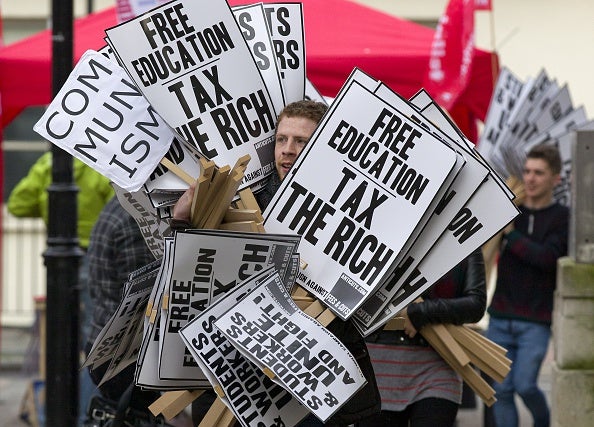For things to change for young people in Britain, student issues need to be displayed on a mainstream platform
'Pick up a copy of a student paper or listen to a student radio station to know that some of us have a lot to say'

This government seems to have decided the easiest target in society today is its youngest members: students. From losing maintenance grants, to the withdrawing of housing benefit and increasing the repayment rate of student loans, the list of reasons as to why younger people need to have a louder voice against the Government’s actions just keeps on getting longer and longer.
As already heavily reported, the younger generation is the first which will see students end up worse-off than their parents. Yet reportage on this topic appears predominantly in the sections designated specifically for student voices. This concerning truth rarely gets aired outside of the media already directed at this group. For anything to change, the issues need to be displayed on a more mainstream platform.
It’s rare for the student voice to make it into the mainstream media, despite the force of our voices through social media becoming stronger every day. Rarely a day goes past at university without the mention or actual undertaking of protests and activism. Yet if you are to believe the national press, we are complacent and spend the majority of our university careers drinking to extortionate levels and ignoring the attacks on our future.
There is obviously an issue of political apathy which has become pervasive within our generation - the issue of us not using our vote being top of the list. As Natalie Bennett argued, however, at the i paper’s recent iDebate in Leeds, we shouldn’t “blame students for not voting.” Instead, “blame politicians for not speaking to students.” The media has a responsibility to play in making this happen; unless it starts documenting young voices, politicians will not view them as being worthy enough to address.
Ironically, even my own student voice will only make it into the student section of this newspaper. The issues we face are deemed our own and not pressing enough for the rest of the country to concern themselves with. There tellingly aren’t middle-aged or pensioner sections within newspapers and, while the argument could be made that having our own section is a reflection of the attention we are being given, it could be argued, instead, that it often allows our views to be side-lined, boxed-off, and allowed to remain largely unheard.
During the run up to the General Election, various media organisations spoke with students, travelling across university campuses, desperate to understand who we were going to back. For a very brief period, we were the stars of the show but, now, once again, we are being ignored. Perhaps the revelation the student vote was not as influential as first anticipated is the reason they’ve turned a blind eye to our views. They were wrong to assume student views were not powerful and, if things carry on as they, they never will be.
I understand entirely now, though, why they ignore us; the generational divide in these government attacks is staggering. As published by the Resolution Foundation last year, while job insecurity has remained relatively stable for the whole workforce over the past twenty years, for those aged 18 to 29, insecure work has risen sharply. This was put down to the rise of the controversial zero-hours contracts and unpaid internships which plague young people, in particular. For those outside of this age bracket, it must be a lot easier to remain blissfully ignorant to the fact their prosperity is being won at the expense of those who represent the future of this country.
We also don’t often help ourselves; the angry voices writing opinion pieces in student newspapers and standing on campuses with placards rarely leave the safety net of these environments and often fail to reach out to anyone who might actually help give our voice some volume. So we also have a role to play in striving towards getting our voices heard. We need to start talking within the environments the national media takes notice of. As I’ve argued before: we need to start making our message relatable to the whole country, rather than just bemoaning the state of things between ourselves.
Nevertheless, you just need to pick up a copy of a student paper or listen to a student radio station to know that some of us have a lot to say. Although , as part of both, I could be biased. Obviously an argument often made is that we don’t say enough, don’t engage with political issues at all and, therefore, are an easy target. Yet, from my position within student media, I have an insight into those who do care and believe their voices alone - if listened to - could actually have an impact.
The political apathy and the inward looking nature of student politics is obviously an issue - but it is a clear byproduct of the fact that, when students do have the courage to speak out nationally, it more often than not gets them nowhere.
Join our commenting forum
Join thought-provoking conversations, follow other Independent readers and see their replies
Comments
Bookmark popover
Removed from bookmarks